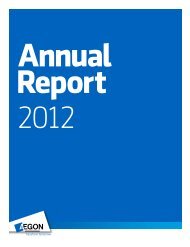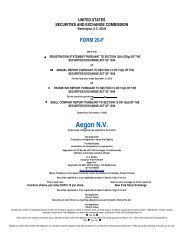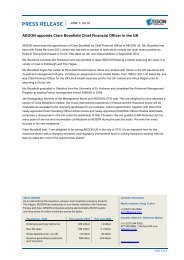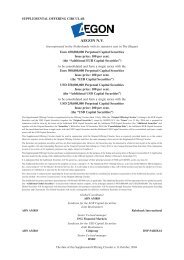Prospectus supplement US007924AH66 - Aegon
Prospectus supplement US007924AH66 - Aegon
Prospectus supplement US007924AH66 - Aegon
Create successful ePaper yourself
Turn your PDF publications into a flip-book with our unique Google optimized e-Paper software.
cash attributable to that income, regardless of the U.S. holder’s method of accounting for U.S. federal<br />
income tax purposes. Under this method, U.S. holders generally will be required to include in income<br />
increasingly greater amounts of OID over the life of the discount notes. Investors should consult their<br />
own tax advisors to determine the U.S. federal income tax implications of the constant-yield method<br />
and regarding the accrual of OID generally.<br />
OID for any accrual period on a discount note that is denominated in, or determined by reference<br />
to, a foreign currency will be determined in that foreign currency and then translated into U.S. dollars<br />
in the same manner as interest payments accrued by an accrual basis U.S. holder, as described under<br />
‘‘Interest’’ above. Upon receipt of an amount attributable to OID in these circumstances, a U.S. holder<br />
may recognize ordinary income or loss.<br />
OID on a discount note will be treated as foreign source income for the purposes of calculating a<br />
U.S. holder’s foreign tax credit limitation. The limitation on foreign taxes, if any, eligible for the U.S.<br />
foreign tax credit is calculated separately with respect to specific classes of income. The rules relating<br />
to foreign tax credits are complex. Each prospective investor should consult its own tax advisor<br />
regarding the availability of foreign tax credits.<br />
Acquisition Premium. A U.S. holder that purchases a debt security for an amount less than or<br />
equal to the sum of all amounts payable on the debt security after the purchase date other than<br />
payments of qualified stated interest but in excess of its adjusted issue price and that does not make<br />
the election described below under ‘‘Election to Treat All Interest as OID’’ will have acquisition<br />
premium. Investors should consult their own tax advisors regarding the U.S. federal income tax<br />
implications of acquisition premium.<br />
Market Discount. A debt security, other than a short-term note, will be treated as purchased at a<br />
market discount (a ‘‘market discount note’’) if the debt security’s stated redemption price at maturity<br />
or, in the case of a discount note, the debt security’s ‘‘revised issue price’’, exceeds the amount for<br />
which the U.S. holder purchased the debt security by at least 0.25% of the debt security’s stated<br />
redemption price at maturity or revised issue price, respectively, multiplied by the number of complete<br />
years to the debt security’s maturity. If such excess is not sufficient to cause the debt security to be a<br />
market discount note, then such excess constitutes ‘‘de minimis market discount’’ and the debt security<br />
is not subject to the rules discussed in the following paragraphs. For these purposes, the ‘‘revised issue<br />
price’’ of a debt security generally equals its issue price, increased by the amount of any OID that has<br />
accrued on the debt security.<br />
Any gain recognized on the maturity or disposition of a market discount note will be treated as<br />
ordinary income to the extent that such gain does not exceed the accrued market discount on that debt<br />
security. Alternatively, a U.S. holder of a market discount note may elect to include market discount in<br />
income currently over the life of the debt security. Such an election shall apply to all debt instruments<br />
with market discount acquired by the electing U.S. holder on or after the first day of the first taxable<br />
year to which the election applies. This election may not be revoked without the consent of the IRS.<br />
Market discount on a market discount note will accrue on a straight-line basis unless the U.S.<br />
holder elects to accrue such market discount on a constant-yield method. Such an election shall apply<br />
only to the debt security with respect to which it is made and may not be revoked. A U.S. holder of a<br />
market discount note that does not elect to include market discount in income currently generally will<br />
be required to defer deductions for interest on borrowings allocable to that market discount note in an<br />
amount not exceeding the accrued market discount on that market discount note until the maturity or<br />
disposition of that market discount note.<br />
Election to Treat All Interest as OID. A U.S. holder may elect to include in gross income all<br />
interest that accrues on a debt security using the constant-yield method as described under the heading<br />
‘‘Original Issue Discount’’, with the modifications described below. For the purposes of this election,<br />
40













